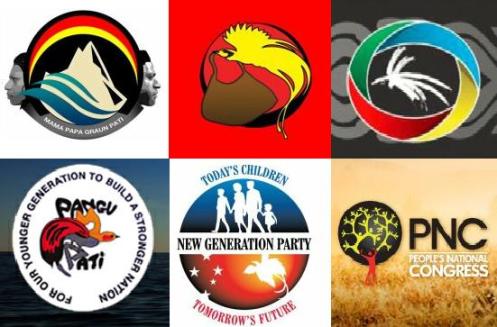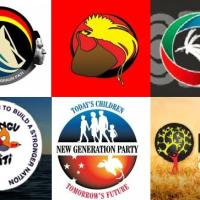PNG Political Parties, Leaders & Candidates

Find below in alphabetical order all 46 parties that have registered to contest the 2012 PNG National Elections with their party leaders and the number of candidates each party has endorsed.
The details included below are primarily based on the PNG Election 2012 Candidate List, and show that the PNG Party has endorsed the highest number of candidates (91), followed by People’s National Congress (89); National Alliance (74); Triumph Heritage Empowerment Party (73); PANGU Pati (60); and then United Resources Party and People’s Movement for Change with 49 candidates each.
It is also worthy to note that two political parties have female leaders, the League for Democracy Party (Janet Sape) and the PNG Greens Party (Dorothy Tekwie):
- Christian Democratic Party – Banare Bun (27 candidates)
- Coalition for Reform Party – Joseph Lelang (15 candidates)
- Indigenous People’s Party – John Taluh Tekwie (44 candidates)
- Kingdom First Party – John Kuwimb (5 candidates)
- League for Democracy Party – Janet Sape (37 candidates)
- Mama Papa Graun Pati – Peter Donigi (21 candidates)
- Mapai Levites Party – Paul Kamakande (16 candidates)
- Melanesian Alliance Party – John Kaputin (38 candidates)
- Melanesian Liberal Party – Allan Marat (15 candidates)
- National Alliance Party – Michael Somare (74 candidates)
- National Conservative Party – ? (?)
- National Front Party – ? (?)
- New Dawn Transformation Party – Alphonse Moroi (32 candidates)
- New Generation Party – Bart Philemon (26 candidates)
- Our Development Party – Puka Temu (22 candidates)
- Pan Melanesian Congress Party – ? (?)
- PANGU Pati – Andrew Kumbakor (60 candidates)
- People’s Action Party – ? (?)
- People’s Democratic Movement Party – Paias Wingti (19 candidates)
- People’s First Party – Luther Wenge (2 candidates)
- People’s Freedom Pati – Moses Murray (25 candidates)
- People’s Heritage Party – Nosare Maika (10 candidates)
- People’s Labor Party – Peter Yama (23 candidates)
- People’s Movement for Change Party – Gary Juffa (49 candidates)
- People’s National Congress Party – Peter O’Neill (89 candidates)
- People’s Party – Peter Ipatas (49 candidates)
- People’s Progress Party – Julius Chan (40 candidates)
- People’s Resources Awareness Party – Michael Uvillio (10 candidates)
- People’s United Assembly Party – Anderson Agiru (29 candidates)
- PNG Conservative Party – John Ban (4 candidates)
- PNG Constitutional Democratic Party – Ila Geno (39 candidates)
- PNG Country Party – Thompson Harokaqveh (47 candidates)
- PNG Destiny Party – Tom Watinga (4 candidates)
- PNG Greens Party – Dorothy Tekwie (6 candidates)
- PNG Labour Party – Bob Danaya (34 candidates)
- PNG National Party – David Yak (45 candidates)
- PNG New Vision Party – Abraham Waiyum (12 candidates)
- PNG Party – Belden Namah (91 candidates)
- Republican Party – ? (?)
- Rural Development Party – Jeffery Nape (30 candidates)
- Social Democratic Party – Powes Parkop (40 candidates)
- Stars Alliance Party – Clement Waine (22 candidates)
- Transform PNG Party – ? (3 candidates)
- Triumph Heritage Empowerment Party – Don Polye (73 candidates)
- United Party – Chris Kopyoto (20 candidates)
- United Resources Party – William Duma (49 candidates)














From the list of parties in PNG there are too much party. Why so much parties? Why don’t we stand together and come up with a few parties? Developed countries like Australia and America have few parties compared to PNG. SO THIS IS A CHALLENGE FOR PARTY LEADERS TO UNITE STAND TOGETHER AND FORM PARTIES FOR THE GOOD OF PAPUA NEW GUINEA
‘Peter’ – There are a number of reasons why PNG has so many political parties. Probably the most influential factor is that informally, our cultural systems and more formally, our current electoral system actually encourages multiple parties based on ‘popular’ individuals, as opposed to policy-based political parties. This can be managed, but will take time and a change in elector attitudes as well as constitutional and electoral reform.
Greed…simple as that greed and pride
Most of the political parties’ policies and development platforms are duplicates. Well me may say that the political parties are formed for the same objective in deliverying services to the population but the fact is that most of them (the political parties) are not being effecctively managed and regulated.
This must be a course of concern for the Registrar of political party, the PNG Electoral Commission and other think tanks like the National Research Institute to analyse the pros and cons of having to many political parties in the country.
I believe there must be some regulatory measures in place to regulate the number of political parties, by reviewing all the development plateforms, policies so that we can set a limite of developing political parties.
Thank you.
MDK